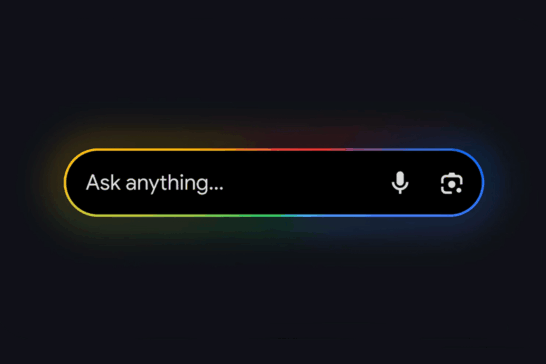As a marketer, you're familiar with the struggle to produce large volumes of insightful content for your audience.
Fortunately, AI has entered the marketing game, making content writing faster. And while AI-generated content is becoming increasingly popular, some professionals still wonder if its benefits outweigh its drawbacks.
If you're among them or just want to explore AI's possibilities, this article will guide you through its pros and cons. Plus, we'll list the top tools to get the most out of generative AI technology for content creation. But, before anything, let’s see what AI-generated content means.
What Is AI-Generated Content?
AI-generated content is the content you create with advanced tech capabilities, such as natural language processing and machine learning.
What’s interesting is that AI content generators understand and reply in human-like language. You put in specific prompts and feed them with data like relevant keywords and topics. The tools, then, analyze large databases and create compelling content in the form of blogs, emails, social media posts, and more.
Marketers are investing in this technology to automate and speed up a large part of their content marketing workflow. In fact, an impressive 87% of marketers use AI-powered solutions to create content.
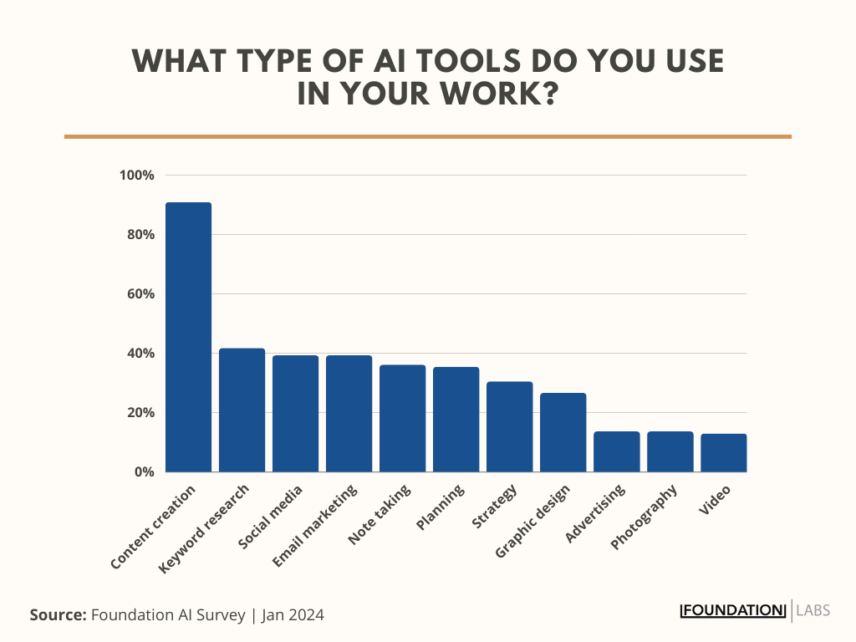
This doesn't mean that AI-produced content doesn't come with its challenges—which all digital marketing professionals should be aware of. To guide you through the process, it's time to explore the pros and cons of AI-generated content.
Pros of Using AI-Generated Content
AI tools bring many advantages to the table, enabling marketers to produce more targeted content in less time while resembling human content creation. Let’s check them out.
Creating quality content faster
Probably the most critical benefit of AI content generators is the speed at which they create high-quality content. A process that may get tiring or confusing when performed by humans. They spend time researching, creating outlines, writing drafts, and proofreading the final version.
AI generation tools help human writers by automating some of the steps mentioned. Even more so when they must produce content on different topics or for multiple industries. With AI, they don't have to be experts on every topic they'll need to write about. All they have to do is fill in the right prompt and wait for the machine to return quality and relevant content in a few minutes.
In addition to that, AI content generators help you optimize content through the vast amount of data they analyze. Such tools help you check the consistency of your content across different marketing platforms by going through elements like your brand voice.
While there are tools offering AI content generation features for free, like ChatGPT, the result may not be as targeted as you'd like. However, a recent hands-on test by G2 compared Gemini and Copilot across creative tasks, such as writing, summarizing, and refining. The impressive article demonstrates how each tool supports content creation in different ways and explores fresh angles with data-driven recommendations.
Still, it's typically better to opt for AI solutions that focus on creating specific content types. Dedicated AI tools are trained to craft more relevant content depending on your unique needs and the requirements of each touch point. For instance, in the case of AI email marketing, reputable email platforms have already incorporated AI-powered features for email content creation.
Basically, you have one tool to send compelling email campaigns that you can also optimize using their AI options. From start to finish, you can choose your email campaign type (e.g., new product announcement), set the tone, turn prompts into targeted email copy, and proofread your work.
The best part is that some email services like Moosend and Constant Contact provide options to generate AI-based content for your landing pages and subscription forms, too, thus killing two birds with one stone. Not only do you leverage the effectiveness and ease of AI technology, but you do so without paying more for extra tools.
Saving time and money
AI doesn’t just help you generate one piece of content faster. It also helps you grow, while saving on your budget.
As your content production needs rise, so do your resources. For example, if you put on your content calendar that your writers have to produce 50 pieces in a month, it will take more time—even for the most experienced writers. Or you'll need to hire more content writers, which, in turn, translates in a higher budget.
On top of that, traditional content creation involves different stages besides the creation per se. For example, human-generated content, more often than not, requires revision. As a result, maybe you'll have to hire editors, too, to refine your content marketing.
AI software allows you to perform efficient spend control since it can do everything from A to Z without extra cost. Also, this technology can generate multiple content pieces and perform the required edits instantly. It's not that AI-generated content doesn't require some editing. But it's usually less demanding and time-consuming compared to human-written content—if you've trained it properly.
Enhancing writers’ creativity
At some point, most people involved in content marketing have experienced the notorious writer’s block. Coming up with inspiring ideas and turning them into valuable content is challenging. This is especially true when there are deadlines or different content types involved.
Unlike what most people believe, AI tools boost human creativity. They can explore fresh angles, highlight underexplored topics, or refine existing ideas with data-driven recommendations. Here´s how it works: the writer feeds the tool with a prompt, and the tool pulls data from various sources online to help them create or optimize content.
But beyond offering inspiration, there are several ways in which AI systems enhance creativity:
- Refining drafts and raw ideas. AI helps writers expand or simplify concepts and find new directions they may not have considered. So, it transforms first drafts and ideas into polished content.
- Boosting experimentation. AI software allows you to experiment with multiple tones and formats quickly based on the prompts you use. Plus, you’re able to create content variations for different audiences to ensure relevance.
- Speeding up brainstorming. Instead of performing research manually, writers leverage AI to test multiple approaches, identify the top-performing, and learn from them.
Improving your SEO efforts
There's a common misconception that generative AI will kill SEO. That’s far from true, though. In fact, AI software is a valuable tool for optimizing content for search engines. It does so by scrolling through thousands of resources that feature already SEO-optimized content. These systems also detect the most effective keywords, including those with low competition and high search volume.
AI's capabilities don't stop at keyword research. They give marketers actionable tips to optimize on-page elements, such as meta descriptions, headings, and internal links. Additionally, AI technology improves content structure and readability. More specifically, this is how AI may boost readability for your content:
- Suggest improvements in vocabulary, grammar, and punctuation
- Restructure and shorten sentences to make them simpler
- Perform readability analysis so you can improve the score of your content
That way, you ensure that your content’s final version aligns with user intent and search engine algorithms, which is the endgame of any SEO checklist.
Cons of Using AI-Generated Content
As tempting as AI can be, we must look at the big picture. AI-generated content comes with limitations. And to stay away from them, you should consider the following drawbacks.
Risking ethical concerns and legal compliance
Before anything, your content marketing should comply with ethical laws and legal regulations. Users are very strict with how businesses manage their data and expect them to have data privacy and security requirements in place.
The problem is that AI-generated content isn't always aligned with these policies, and concerns about AI ethics keep rising. Consult with security experts to make sure your content adheres to fundamental values, such as privacy and non-discrimination guidelines. And before publishing AI-generated content, keep the following content marketing tactics in mind:
- Be transparent about the use of AI-generated content
- Double-check your content for inappropriate, offensive, or misleading content
- Mitigate potential biases to meet content-inclusive standards
Falling into the trap of plagiarism or poor-quality content
AI writing assistants pull information from online sources. But they're not trained to cite them. So, if AI generators use existing content without rephrasing it, chances are that search engines might flag your resources as plagiarized. This might lead to serious trouble if the creator of the original content decides to pursue legal action.
But besides legal risks, AI-generated content can feel unoriginal. AI tools often give similar or repetitive answers, ignoring your tone of voice. Unless you edit it, the outcome will be generic content that turns readers off.
Lacking imagination and understanding of human emotions
AI-powered systems use pre-existing data for creating any type of content. But what about content pieces that ask for the writer´s unique point of view? Well, this is an area that these tools can’t cover. So, it’s only natural that the content may sound robotic.
AI content creators can’t think out of the box and match human creativity. They can’t understand human emotions and qualities, such as humor and empathy. At least for now, machines don’t possess the emotional reasoning that’s part of human nature. And this particular quality is why customers choose to connect with your brand on a more personal level.
The fact that AI tools rely on existing resources results in another drawback: lack of imagination. They can’t develop groundbreaking content or unique ideas. So, before promoting the content you create with AI, make sure there's always a human who reviews such pieces.
Requiring human editing
From complying with legal requirements to writing in a unique voice, the human factor is inevitably part of the content production equation. Publishing content without human editing is something you must avoid. The human touch in your text impacts how users think of your brand since meaningful connections is one of their most common requirements.
AI technology isn’t designed to understand the complexity of human expression, which could lead to mix-ups, inaccuracies, or inappropriate language. Therefore, you’ll need a human editor to ensure your final text follows quality standards while being accurate and unique.
Top AI Content Generation Tools
AI technology is here to stay in many aspects of the marketing workflow. So, marketers and business owners wanting to step up their game should incorporate AI-generated content into their marketing efforts to step up their game. That's why we’ve gathered the best AI content generation tools to create top-notch content.
Moosend
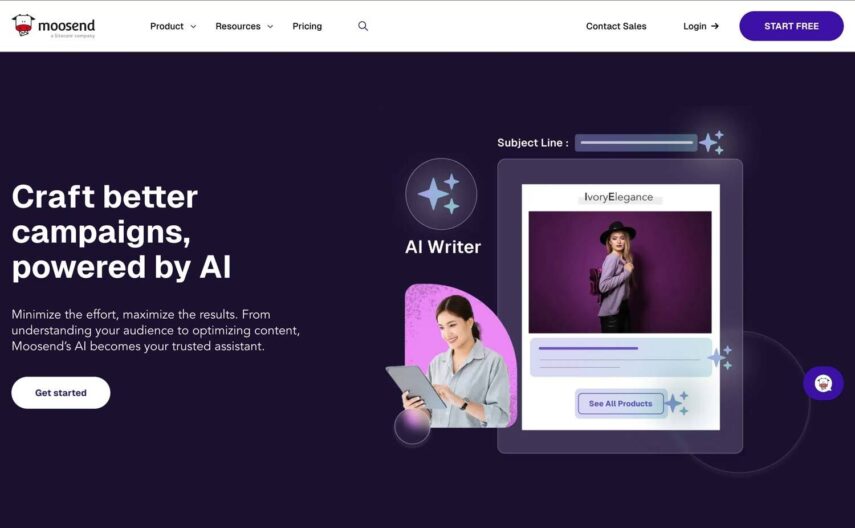
Moosend is a popular email marketing platform that leverages AI capabilities for different aspects of your marketing strategy. Using its AI-powered writer, you fill in specific keywords and prompts, and the tool generates copy you can use on various marketing projects including emails and landing pages. You can also get suggestions for your existing copy and adjust results to match your brand’s tone of voice.
Besides the AI writer tool, Moosend offers a tool called Refine that allows you to create and optimize your email subject lines. All it takes is complete your industry and subject line prompts and Refine brings back predictions regarding open rates, as well as optimization suggestions. The more you feed it with data, the more it improves and gives you increased open rates.
Moving to eCommerce-related features, Moosend's algorithms analyze information like the recipient's buying history and interests to deliver personalized product recommendation emails. Its AI-powered Audience Discovery tool goes through different customer data, helping you predict their behavior. Then, it splits recipients with similar interests and levels of engagement into dynamic segments, a process that allows for a deeper understanding of their purchase intent for specific products or brands.
Jasper
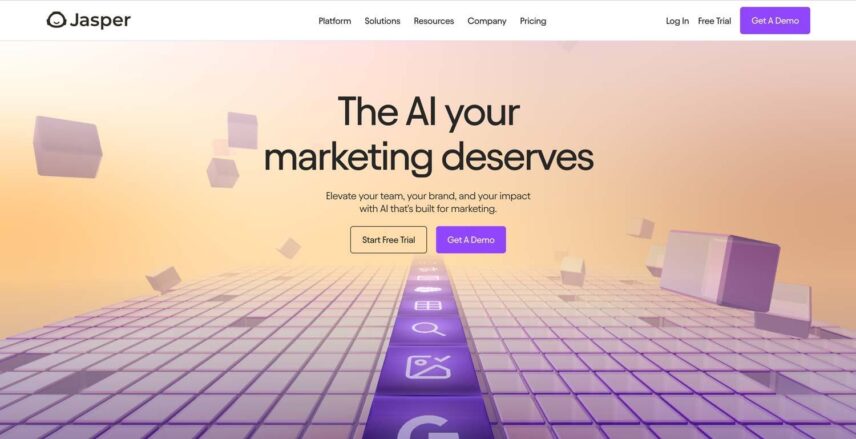
Jasper is one of the most reputable writing assistants, trusted by thousands of marketers to craft marketing content. From blog post ideas to campaign briefs, it offers more than 500 prompts to choose from to spark your imagination.
All you need to do is enter the required information for the selected template, such as the tone of voice and keywords. Jasper is particularly effective in producing long-form content, too, as long as you give it a precise prompt to work with. Also, you can summarize articles and use them for content repurposing.
With add-ons like Google Docs and Microsoft Word, Jasper lets you leverage its capabilities within these tools. But the software isn’t limited to copywriting since it offers seamless integration with several marketing tools, such as Surfer SEO.
Hubspot
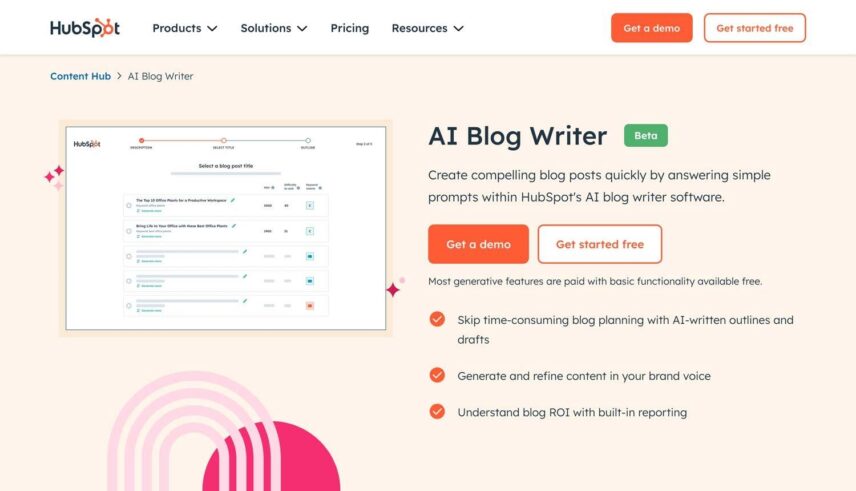
Almost every marketer has heard of HubSpot with its CRM and marketing features. What they may not know is that it has incorporated a powerful AI Blog Writer. Facilitating blog post creation, their AI solution offers options not only to produce and optimize outlines and drafts but also monitor analytics to measure your content's ROI.
HubSpot's Content Hub includes a new capability called Breeze Content Agent that makes creating content for landing pages, case studies, even podcasts a breeze—pun intended. The tool understands your unique brand voice. Then, it uses it along with your CRM data to align the content with your tone and customer profiles and improve lead targeting. There's even an option to improve your multichannel marketing efforts by repurposing content across touch points.
Copy.ai
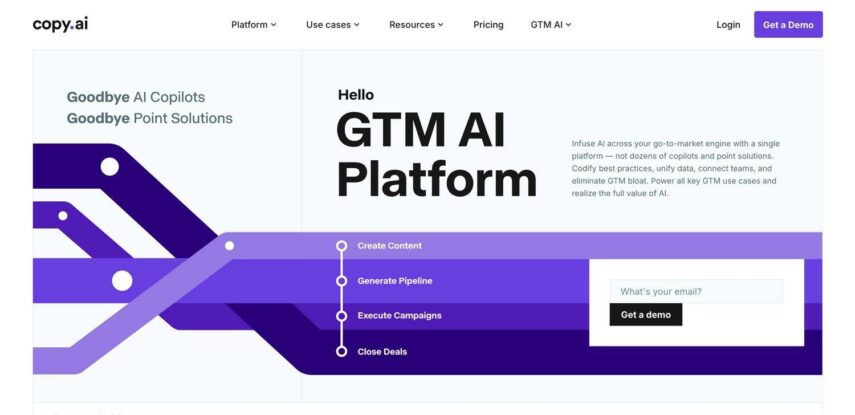
Copy.ai is an AI generator destined for marketers who want to craft different types of content in a few clicks. You just pick the template that best suits your needs, and the user-friendly AI writer takes care of the rest using an advanced language model. Copy.ai’s focus areas include blogs, social media, and paid ads.
The tool goes beyond copywriting needs, providing users with options to edit and refine their content, even optimize it for search engines. A very useful feature that not all AI solutions offer is its content creation for events, helping you with event marketing from invites to follow-ups. Another standout capability is that you can use multiple brand voices, adjusting them based on who's writing the piece or which audience they need to target.
Leveraging AI's Benefits, Avoiding its Traps
AI-generated content has proven to be an excellent asset for any content marketing team in need of a helping hand. AI writing assistants are your-go to tools to create all kinds of targeted content quickly and without breaking the bank.
That's how AI technology for content creation helps brands save time and effort so human writers focus on more creative and complicated tasks. But while there are many advantages, no marketer should trust AI blindly.
AI content generators may sometimes fall short in producing truly unique and audience-resonating material. That’s why it’s essential to humanize AI content, either with extensive human editing or consider market-leading tools such as Walter Writes AI which are gaining strong traction. It's critical to note that AI tools should be used as complementary assets rather than replacements for human creators.
Our guide has given you all the necessary information about AI-generated content, including its benefits and drawbacks. Now it’s time to let your own creativity work wonders with the help of the right AI writing assistant.

